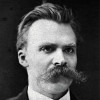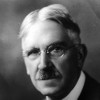“ A thing has intrinsic value when it is prized for its own sake, not as a means to something else. ”
Bertrand Russell, A History of Western Philosophy (1945). copy citation
| Author | Bertrand Russell |
|---|---|
| Source | A History of Western Philosophy |
| Topic | value prize |
| Date | 1945 |
| Language | English |
| Reference | |
| Note | |
| Weblink | http://www.ntslibrary.com/PDF%20Books/History%20of%20Western%20Philosoph... |
Context
“The above statement of the ethical problem is defective in one important respect, namely, that it does not take account of the distinction between ends and means. An eye in a living body is useful, that is to say, it has value as a means; but it has no more intrinsic value than when detached from the body. A thing has intrinsic value when it is prized for its own sake, not as a means to something else. We value the eye as a means to seeing. Seeing may be a means or an end; it is a means when it shows us food or enemies, it is an end when it shows us something that we find beautiful. The State is obviously valuable as a means:”
source



